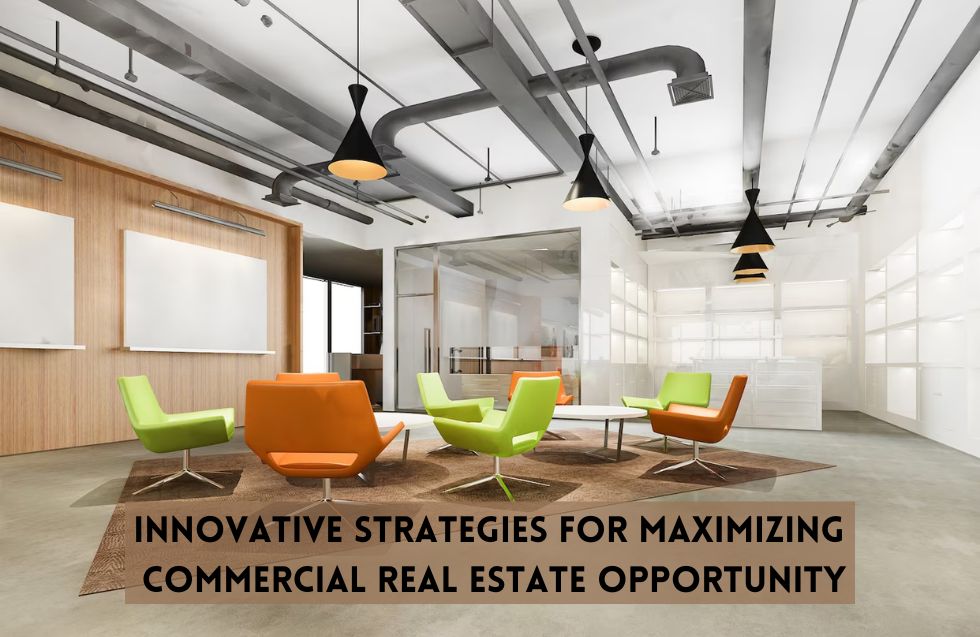Commercial real estate is a dynamic area to which businesses look for much more than space; it represents a cornerstone for innovation, collaboration, and brand identity. With the ways markets are trending and the reevaluation of business space, fresh approaches will be required for CRE strategy and creative solutions. This article covers innovative approaches to commercial real estate, probes for market trends, and gives actionable insights on how businesses.
Rethinking Commercial Real Estate: Beyond Traditional Uses
Traditionally, CRE was a rather straightforward transactional process where businesses rented or bought space in which to operate. Nowadays, however, modern businesses use CRE as a method of growing and innovating themselves, differentiating them from others.
1. Office Spaces as Collaboration Hubs
As hybrid work increases, offices are no longer the location to which employees commute daily. Businesses at the forefront are reenvisioning offices as collaboration and innovation hubs. The common feature one finds within such a setup includes:
- Open design or flexible layout: Companies use modular furniture and movable walls to make the spaces adaptable to multiple uses.
- Incorporating Technology: Smart screens, virtual conferencing setups, and IoT devices that allow collaboration across dispersed locations.
The wellness-considerate design allows for natural lighting, indoor plants, and quiet zones in consideration of employee well-being.
2. Retail Spaces as Experiential Venues
Retailers are redefining brick-and-mortar stores as venues for experiences rather than mere transactions. Examples include:
- Pop-up shops expose brands to high levels of foot traffic for a short period.
- Showrooms are spaces where customers can interact with the product while buying online.
- Community-driven events in retail spaces, like workshops or meetups, help connect deeper with local audiences.
3. Industrial Real Estate for E-Commerce Expansion
As e-commerce continues, companies are reusing industrial facilities to deploy fulfillment centers, micro-distribution hubs, and last-mile delivery stations. General performance is interconnected with efficient space utilization in these buildings.
Sustainability as a CRE Differentiator
Environmentalism stopped being optional long ago and has now become part and parcel of any serious CRE strategy. Properties with sustainability features now pass as attractive to tenants and investors.
1. Green Certifications and Energy Efficiency
In buildings certified by programs such as LEED- Leadership in Energy and Environmental Design or BREEAM – Building Research Establishment Environmental Assessment Method, far superior rental return is possible. Amenities such as:
- Renewable energy systems – solar photovoltaic panels
- Rainwater collection system
- Advanced HVAC linked to lesser energy consumption
2. Adaptive Reuse Projects
Developers now conceptualize new uses for old structures rather than building from scratch. Converting warehouses into co-working spaces or historic buildings into boutique retail could maintain the sense of history while serving modern needs.
3. Urban Farming within the Commercial Space
Innovative properties now incorporate urban farming into unused areas like rooftops or atriums. Projects like these also contribute to sustainability, adding to the community atmosphere by providing fresh produce to tenants.
Leveraging Data and Technology in CRE
Data and technology are revolutionizing the way businesses approach CRE with informed, smart decisions that ensure maximum returns.
1. Predictive Analytics for Market Trends
CRE companies use big data to study patterns such as urban migration, industry growth, and demographic shifts. It is through predictive analytics that a business can select locations with maximum success potential.
2. Virtual and Augmented Reality (VR/AR)
The way properties are presented to the clients is changing due to technologies like VR and AR. Virtual tours allow prospective tenants to take property tours from afar, while AR can overlay how a space may be personalized for them.
3. Blockchain for Secure Transactions
Blockchain technology is gaining heavy traction in ensuring that real estate transactions become secure, more transparent, and unalterable. Smart contracts, bolstered by blockchain, provide automation for lease agreements and payment processes.
Creative Leasing Strategies
The competition needs to think out of the box and beyond traditional lease agreements to attain the best spaces. Some of the ways include:
- Short-Term and Flexible Leasing: Short-term leases allow the business to test markets prior to making long-term investments. Similarly, flexible leasing arrangements- like coworking memberships- are particularly apt for startups or remote-first companies.
- Revenue-Sharing Models: Some landlords and tenants now implement revenue-sharing agreements. Instead of paying fixed rents, tenants pay a share of revenues in rent, which further aligns incentives between the landlord and the tenant.
- Build-to-Suit Agreements: Build-to-suit leases entail a tenant collaborating with developers to design a space to suit their needs while the developer finances and owns the property. This is particularly common for warehouses, data centers, or any other unique office space.
Charlotte: A Prime Market for CRE Innovation
The CRE market presents a number of exciting opportunities in Charlotte. That is, this city has been able to develop into an innovation and growth hub with a strong economy and strategic location, backed by a diversified workforce. Every company seeking to get competitive in these markets will now be able to take advantage of Charlotte’s diverse business environment. You can lease office space in Charlotte and check out the best available for your needs.
1. Financial and Corporate Growth
Besides all the Fortune 500 companies it houses, Charlotte hosts an extremely active financial sector. For companies wishing to rent office space in Charlotte, all this translates into an accessible supply of corporate resources and talent.
2. Infrastructure and Connectivity
Infrastructure is well developed in Charlotte, and its proximity to main transportation routes makes it perfect for industries such as logistics and technology. Besides, the mixed-use developments available in the South End further create an attractive environment.
3. Cultural Scene
The high cultural dynamism of the city and quality of life enable it to attract top talent. Thus, making it one of the best locations for businesses with growing ambitions in the competitive market.
Adding Value by Plugging into the Community
Today’s CRE is as much about community integration as it is about space procurement. Companies are looking for locations that reflect their values and continue to support the community.
1. Community Initiative Support
Partnership on local initiatives, such as funding public art projects, or events involving the community of tenants and landlords, has greatly helped engender good relations and improved ties with the neighborhood.
2. Shared Space
Properties that boast events, coworking areas, or pop-ups go a long way to make their surroundings vibrant for the benefit of tenants and their communities.
Wrapping Up
In fact, the CRE landscape is changing, with demanding business operations, new technologies up for introduction, and sustainability considerations paramount. Companies that approach CRE with innovative usage in mind, community involvement, and evidence-based decisions amass immense benefits accruable from competitive advantage.
For companies looking to expand their operations into Charlotte, North Carolina, an opportunity to lease office space in Charlotte unlocks tremendous opportunities for innovation and growth. It is how creative leasing options, sustainability, and technology offer great opportunities for businesses to make educated decisions that will create the path to their long-term success.













